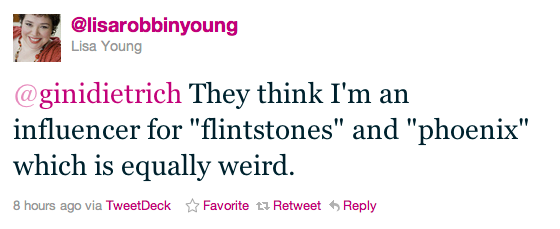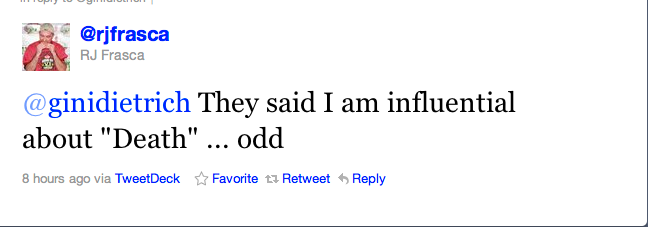 I’m not a fan of Klout. Determining influence based on how someone participates online (mostly Twitter) is baloney. For instance, it shows I’m more influential than Jay Leno, which is just laughable.
I’m not a fan of Klout. Determining influence based on how someone participates online (mostly Twitter) is baloney. For instance, it shows I’m more influential than Jay Leno, which is just laughable.
But I have to hand it to them. With the launch of +K, they’ve incorporated four elements of gaming that makes me envious…and make me want to log into my account every day.
Game Dynamics
Last week Lisa Gerber wrote about the four game dynamics that drive game play, according to Seth Preibatsch, chief ninja of SCVNGR. If you didn’t watch his TedX video from her blog post, I recommend it. I’m not a video person, but it’s the best 12 minutes I’ve spent in a long time (other than cycling).
But my point is that Klout has figured out how to use all four of the dynamics he discusses with +K: Appointment, influence and status, progression, and community.
Appointment. The idea here is that you create a reason for people to come back at a specific time. Klout does this by giving you five +K points to award to friends each day. That certainly makes me want to login and treat my friends.
Influence. It’s not a surprise Klout is trying to determine influence, based on how you use Twitter and Facebook. But what they’ve done with +K is let your friends determine your influence. They give you a list of topics (some of them wrong; see “the cons?”) and you can vote on where you think they’re most influential.
Progression. This aspect was already incorporated into the dashboard. When you add your Twitter, Facebook, and LinkedIn profiles, you like them on Facebook, and you tweet your score, you get an A+ in filling out your profile. They give you granular ways to easily complete the process.
Community. While they don’t fully have the community piece figured out, what is there goes hand-in-hand with influence. If you and your friends band together, you can help each other create and keep a leadership position. For what? Klout Perks, I guess. Or a high Klout score, perhaps.
The Cons?
Yesterday I tweeted, “According to Klout, I’m influential in ‘drugs’ and ‘Army.'”
Say what?
Sure, it also lists me as influential in social media strategy, blogging, entrepreneurship, Chicago, and marketing. But drugs and Army? I guess my cocaine-filled dance parties that I have with the Army every night are seeping into my Twitter stream. Oy.
That tweet garnered some pretty funny responses.
Lisa Young said she’s influential for Flintstones and Phoenix. She lives in Flint, Mich., so maybe they made a connection to Flintstones that way, but Phoenix?
And R.J. Frasca is influential about death. I asked him if Klout knows something he doesn’t.
So, while I still don’t recommend you use Klout to determine who the influencers are that you should be targeting, I do suggest you check out how they’re using the four gaming dynamics to pull you in.
There are some good lessons in there you can apply to your own PR and/or marketing programs.


